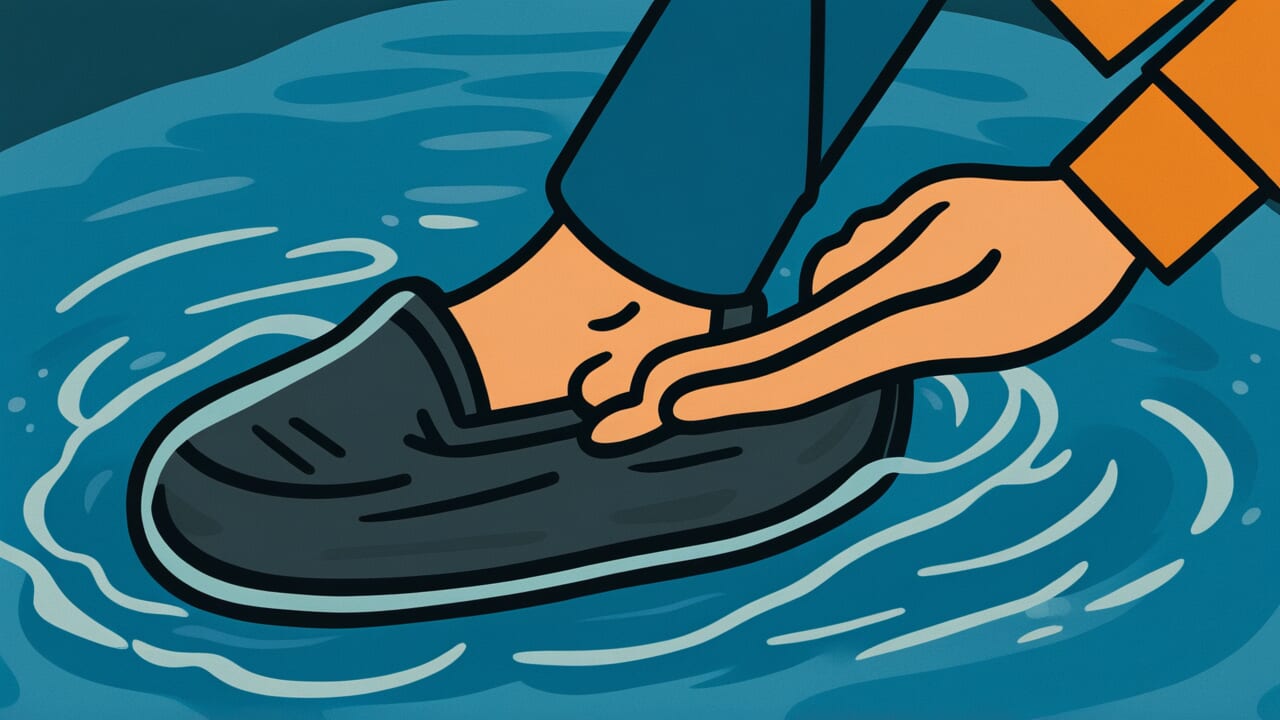How to Read “As welcome as water in one’s shoes”
As welcome as water in one’s shoes
[az WEL-kum az WAH-ter in wunz shooz]
All words use standard pronunciation.
Meaning of “As welcome as water in one’s shoes”
Simply put, this proverb means something is completely unwanted and causes nothing but trouble.
The literal image paints a clear picture. Water in your shoes makes every step uncomfortable. Your socks get soggy and cold. Walking becomes unpleasant. You want to fix the problem right away. The proverb uses this familiar discomfort to describe anything unwelcome.
We use this saying when something arrives at the worst possible time. Think about unexpected bills when money is tight. Or having your phone die during an important call. Maybe it’s rain on your wedding day. These situations feel just as unwanted as soggy feet. They disrupt our plans and create immediate problems.
What makes this proverb clever is how it captures total rejection. Water in shoes isn’t just slightly annoying. It demands immediate attention and ruins your comfort. When we say something is “as welcome as water in shoes,” we mean it’s not welcome at all. The comparison helps others understand just how unwanted something really is.
Origin and Etymology
The exact origin of this proverb is unknown, though it appears to be relatively modern compared to ancient sayings.
The saying likely developed during times when people walked long distances regularly. Before cars and modern transportation, wet feet were a serious concern. Water in shoes could lead to blisters, cold, and even illness. People understood this discomfort intimately. The comparison would have made immediate sense to anyone who traveled on foot.
Folk sayings often emerge from shared experiences that everyone can relate to. This proverb probably spread through everyday conversation rather than literature. People found the image so perfectly captured unwelcome situations that it stuck. Over time, it became a colorful way to express complete rejection. The saying remains useful today because we still understand how unpleasant wet shoes feel.
Interesting Facts
The word “welcome” comes from Old English meaning “a pleasing guest” – literally someone whose coming brings joy. This proverb creates humor by pairing “welcome” with something nobody would ever want. The contrast makes the rejection even stronger than simply saying “unwanted.”
Usage Examples
- Manager to employee: “Your surprise overtime assignment on Friday evening was – As welcome as water in one’s shoes.”
- Host to friend: “His unexpected visit during our family dinner was – As welcome as water in one’s shoes.”
Universal Wisdom
This proverb reveals something fundamental about human psychology and our relationship with discomfort. We naturally seek comfort and stability in our daily lives. When something disrupts that comfort, our immediate response is rejection. The saying captures this universal human tendency to categorize experiences as either helpful or harmful to our well-being.
The wisdom goes deeper than simple preference. Humans evolved to quickly identify and avoid sources of discomfort because survival often depended on it. Wet feet in harsh conditions could mean frostbite or infection. Our ancestors learned to recognize and communicate about unwelcome situations efficiently. This proverb represents that ancient survival mechanism translated into social communication. We still use the same mental shortcuts to evaluate whether new situations help or harm us.
What makes this particularly human is our need to share these judgments with others. We don’t just experience discomfort privately. We create colorful language to help others understand our feelings. The proverb serves as social communication, warning others about unwelcome situations while also seeking understanding and sympathy. This reflects our deep need for community validation of our experiences, even negative ones.
When AI Hears This
Water in shoes reveals how humans create invisible safety zones around themselves. These mental boundaries aren’t just about physical comfort. They mark what belongs in our world and what doesn’t. When something crosses these lines uninvited, people feel violated rather than just annoyed. The wet sock triggers the same mental alarm as unwanted advice or pushy salespeople.
This boundary system runs automatically in human minds without conscious thought. People sort their entire world into “belongs here” versus “doesn’t belong here” categories. Friends, foods, ideas, and experiences all get sorted this way instantly. The system protects humans from chaos by keeping incompatible things separate. It explains why mixing categories feels so deeply wrong to people.
What fascinates me is how this mental sorting creates both human suffering and human thriving. The same system that makes people reject helpful outsiders also protects them from real threats. Humans would be overwhelmed without these invisible filters constantly working. Their “irrational” reactions to boundary violations actually serve as sophisticated early warning systems for deeper problems.
Lessons for Today
Understanding this wisdom helps us recognize and communicate about unwelcome situations more effectively. Sometimes we struggle to express just how unwanted something is. This proverb gives us a vivid way to convey complete rejection. It helps others understand the intensity of our feelings without lengthy explanations.
The saying also reminds us that everyone experiences unwelcome situations differently. What feels like water in shoes to one person might be manageable to another. Learning to express our discomfort clearly helps others understand our boundaries and needs. At the same time, when others use strong language like this, we can better appreciate their genuine distress rather than dismissing their concerns.
Perhaps most importantly, this wisdom acknowledges that unwelcome experiences are part of life. The proverb doesn’t suggest we can avoid all discomfort. Instead, it gives us a way to name and share these experiences. Sometimes simply having the right words to describe our situation provides relief. The colorful comparison can even add humor to difficult moments, helping us cope with life’s inevitable inconveniences while maintaining our sense of perspective.



Comments